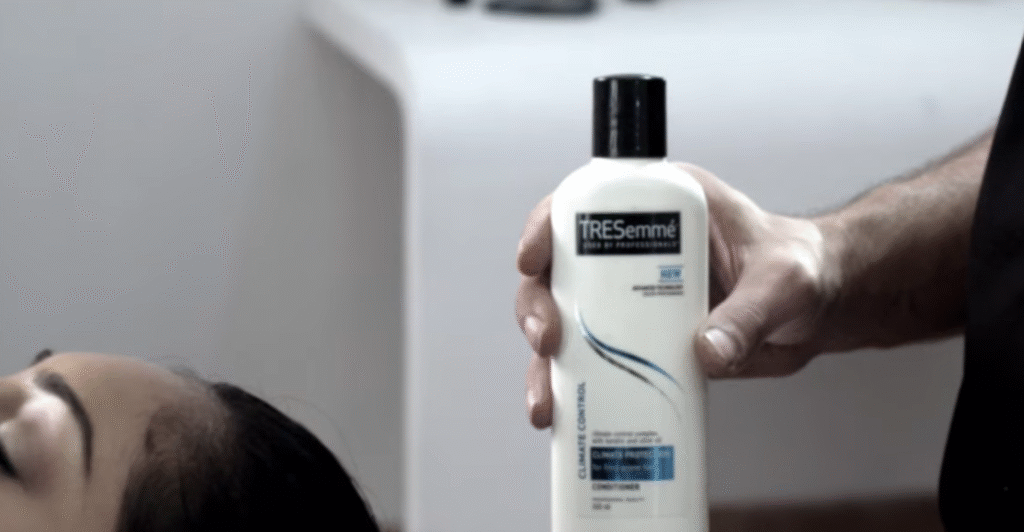Tresemmé has been promoted as a salon-trusted brand for decades, giving customers the opportunity to get professional-caliber results right from the shelf of their neighborhood store. However, class action lawsuits alleging that the brand’s shampoos and conditioners cause painful scalp damage and hair loss have put it under intense legal scrutiny. In courtrooms across the United States and Canada, what was once a symbol of glamour and care is now being questioned in a remarkably successful narrative shift.
DMDM hydantoin, a preservative that has long been used in cosmetics to stop bacteria from growing in water-based products, is at the heart of the lawsuits. Although its use has been accepted as normal, the ingredient has one concerning feature: it releases trace amounts of formaldehyde, a chemical linked to allergies, irritation, and even the development of cancer after prolonged exposure. Customers who filed the lawsuits claim that Tresemmé’s keratin shampoos caused them to experience severe emotional distress, burns on their scalps, and thinning hair. The experience felt a lot like betrayal to those who believed the brand’s glitzy claims of nourishment and shine.
Tresemmé’s parent company, Unilever, vehemently denies any wrongdoing. The business keeps faith in its formulas by stressing that every product is put through a rigorous testing process and complies with the strictest safety regulations. In a move that seemed noticeably better but did little to allay consumer concerns, they also declared that products would be reformulated to eliminate DMDM hydantoin by July 2021. Rebuilding trust is more difficult when identity and appearance are at risk.
Tresemmé Brand & Lawsuit Information
| Category | Details |
|---|---|
| Brand | Tresemmé |
| Owner | Unilever (Parent Company) |
| Founded | 1947 |
| Industry | Hair Care – Shampoos, Conditioners, Styling Products |
| Notable Lawsuit | Class action lawsuits filed from 2020 onwards |
| Allegations | Use of DMDM hydantoin, a preservative that may release formaldehyde, allegedly causing hair loss and scalp irritation |
| Company’s Position | Products are safe, rigorously tested, meet international safety standards |
| Current Status | Multiple lawsuits in U.S. and Canada, some pending, others dismissed |
| Past Legal Context | Unilever settled $10.2 million lawsuit in 2014 over Suave keratin products |
| Reference | https://topclassactions.com/beauty-products/class-action-lawsuit-claims-maker-of-tresemme-liable-for-hair-loss-scalp-burns |

The dispute didn’t start all by itself. Because social media platforms magnify individual stories into collective outrage, consumer activism in the beauty industry has increased over the past ten years. Users compared hair loss stories and cautioned others against specific Tresemmé products on Reddit forums, YouTube reviews, and Instagram posts, which became the focal points of the discussion. These online communities were remarkably successful in advancing legal action, much like bees swarming to defend their hive. This illustrates how digital spaces now compete with corporate advertising in influencing public opinion.
A remarkably similar pattern from Unilever’s past is also present in this lawsuit. The company settled for $10.2 million in damages after recalling its Suave keratin line in 2012 due to safety concerns. Ten years later, Tresemmé is facing almost the same accusations, which begs the question of corporate responsibility and learning. Were safer options disregarded or thought to be too expensive? Customers are demanding incredibly clear answers because they are less forgiving and more knowledgeable now.
Tresemmé’s legal issues relate to a growing skepticism regarding the so-called “clean” and “natural” movements in the larger context of beauty. Procter & Gamble and Sephora, among other large corporations, have been sued for allegedly deceiving customers with claims of sustainability and purity. When terms like “natural” and “clean” lack standardized definitions, brands function in a gray area that is extremely effective for marketing but dangerously ambiguous for customers. Tresemmé’s case demonstrates how this kind of ambiguity can backfire, converting astute branding into legal liability.
For those who are directly impacted, the harm goes beyond just hair. Identity, self-assurance, and even cultural pride are symbolized by hair. It can be extremely personal and evoke tales of betrayal if you lose it as a result of using a product that is promoted as professional-grade care. Once quick to support Tresemmé campaigns, celebrities and influencers have become quiet, leaving a noticeable gap in public discourse. Their absence highlights an unsettling reality: even the most polished brand ambassadors back off when lawsuits arise, leaving customers to vent their frustrations on their own.
Notwithstanding legal obstacles—some class certifications have been rejected, while others are still pending—the cases are influencing how consumers will be trusted in the future. The publicity has already had an impact, even if Unilever wins the case in court. Customers are now much more adept at sharing information online, challenging ingredients, and switching allegiance to companies that guarantee transparency. Smaller beauty startups stand to gain, demonstrating how competition can spur constructive industry reform. They are especially creative in emphasizing safe and environmentally friendly ingredients.
These lawsuits have a particularly positive social impact in terms of increasing awareness. The FDA and other regulatory bodies have already released updates regarding formaldehyde-releasing chemicals found in hair products. Proponents contend that this is an opportunity to strengthen government oversight and shield consumers before harm arises. Litigation in the beauty industry, ranging from talc-based powders to keratin treatments, has frequently come before changes in policy in recent years. Tresemmé’s lawsuits might advance the line once more, guaranteeing safer formulations and significantly better regulations in the future.
In the long run, the Tresemmé case reflects changing consumer power and is more than just a court case. In the past, consumers only trusted advertisements and branding. These days, they read court documents, compare ingredient lists, and take part in group activism. Beauty businesses will need to be extremely adaptable in the years to come, not only in terms of their product offerings but also in terms of their capacity to exhibit accountability, transparency, and authenticity.

